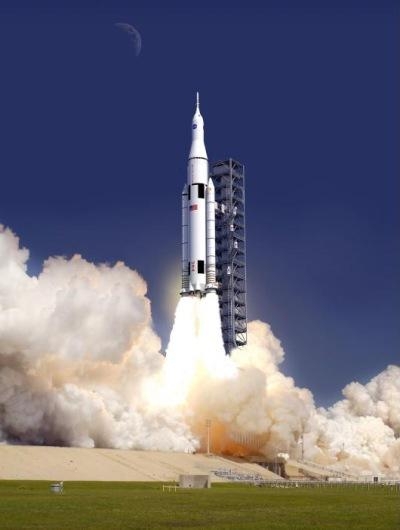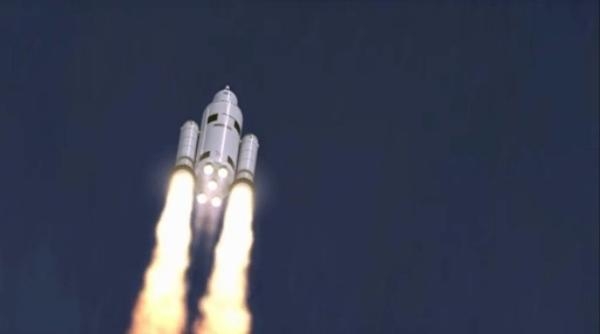Mon, Sep 26, 2011
Sets Timelines For Development Of SLS Components
NASA has released the acquisition overview for the Space Launch
System (SLS), its new, advanced, heavy-lift launch vehicle. NASA
officials say this new heavy-lift rocket - in combination with the
Orion crew capsule already under development, increased support for
the commercialization of astronaut travel to low Earth orbit, an
extension of activities on the International Space Station until at
least 2020, and a fresh focus on new technologies - is key to
implementing the plan laid out by President Obama and Congress in
the bipartisan 2010 NASA Authorization Act.

The booster will be America's most powerful since the Saturn V
rocket that carried Apollo astronauts to the moon and will launch
humans to places no one has gone before. The rocket will give the
nation a safe, affordable and sustainable means of reaching beyond
our current range of space exploration. It will open new
discoveries from unique vantage points and destinations far from
Earth.
The SLS will carry the Orion Multi-Purpose Crew Vehicle and its
astronaut crew, cargo, equipment and science experiments to an
asteroid by the middle of the next decade and then to Mars.
The specific architecture was selected after analysis of the
combination of technologies that would effectively meet the SLS
capability requirements. The architecture also uses an evolvable
development approach. This type of approach allows NASA to address
high-cost development activities early on in the program while
taking advantage of higher buying power before inflation erodes the
available funding in a fixed budget.

Initial planning is for the following:
- Boosters – utilization of the five segment Ares First
Stage Boosters under the existing contract for the initial flights,
the first of which is targeted for the end of 2017.
- Advanced Boosters – to be utilized for missions beyond
the initial flights -The Agency will not specify solutions (i.e.
liquid or solid propulsion may be proposed), but will instead
solicit solutions to meet performance and interface requirements.
-A risk reduction solicitation will be issued later this calendar
year to improve the competitiveness of competing propulsion
technologies and business cases before work begins on the actual
Design, Development, Test and Evaluation (DDT&E) of the final
booster configuration. -DDT&E will be solicited in the
2013-2014 timeframe after results are received from the risk
reduction effort.
- Stages – utilization of the existing Ares Upper Stage
contract for the integrated SLS Core Stage and Upper Stage for the
initial SLS capability through 2021.
- Avionics - utilization of the existing Ares Instrument Unit
Avionics contract for the initial SLS capability through 2021.
- Engines – for the Core and Upper Stages -Core Stage
Engine - utilization of the existing inventory of RS-25Ds for the
initial SLS capability. -Upper Stage Engine – utilization of
the existing Ares J-2X development contract.
- Spacecraft and Payload Adaptors, and Payload Fairing–
initial in-house design efforts followed by competitive
acquisitions beginning in the 2013 timeframe.
- Advanced development - a combination of in-house tasks and
competitive opportunities for industry and academia beginning in
2012.
- Systems Engineering and Integration – NASA led at least
through SLS critical design review (CDR) in 2014.
(Images courtesy NASA)
More News
Aero Linx: International Federation of Airworthiness (IFA) We aim to be the most internationally respected independent authority on the subject of Airworthiness. IFA uniquely combi>[...]
Ultrahigh Frequency (UHF) The frequency band between 300 and 3,000 MHz. The bank of radio frequencies used for military air/ground voice communications. In some instances this may >[...]
A Few Questions AND Answers To Help You Get MORE Out of ANN! 1) I forgot my password. How do I find it? 1) Easy... click here and give us your e-mail address--we'll send it to you >[...]
From 2019 (YouTube Edition): Learning To Paint Without Getting Any On Your Hands PPG's Aerospace Coatings Academy is a tool designed to teach everything one needs to know about all>[...]
Also: Sustainable Aircraft Test Put Aside, More Falcon 9 Ops, Wyoming ANG Rescue, Oreo Cookie Into Orbit Joby Aviation has reason to celebrate, recently completing its first full t>[...]
 ANN's Daily Aero-Linx (05.06.25)
ANN's Daily Aero-Linx (05.06.25) ANN's Daily Aero-Term (05.06.25): Ultrahigh Frequency (UHF)
ANN's Daily Aero-Term (05.06.25): Ultrahigh Frequency (UHF) ANN FAQ: Q&A 101
ANN FAQ: Q&A 101 Classic Aero-TV: Virtual Reality Painting--PPG Leverages Technology for Training
Classic Aero-TV: Virtual Reality Painting--PPG Leverages Technology for Training Airborne 05.02.25: Joby Crewed Milestone, Diamond Club, Canadian Pilot Insurance
Airborne 05.02.25: Joby Crewed Milestone, Diamond Club, Canadian Pilot Insurance




